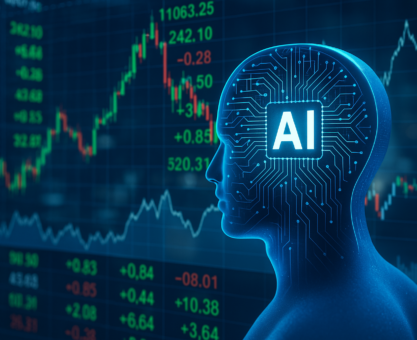Generative AI: From Experimentation to Business Necessity in 2025
The year 2025 witnesses the solidification of generative AI as a fundamental technology for businesses, moving beyond initial experimentation to widespread adoption and demonstrating significant impacts on productivity. Data indicates a substantial increase in generative AI adoption within enterprises in early 2024, reaching 30-40%. Notably, around 92% of AI users leverage this technology specifically to enhance productivity. This focus on tangible outcomes is underscored by the substantial return on investment (ROI) being realized across various sectors, making generative AI an indispensable tool for business growth.
Generative AI’s Economic and Industrial Impact
Financial services companies are at the forefront, reporting the highest ROI from generative AI, followed by significant gains in media and telecommunications, mobility, retail, energy, manufacturing, healthcare, and education. Projections estimate that generative AI now constitutes approximately 30% of the entire AI market, with a valuation nearing $60 billion, highlighting its growing economic significance. Research from Accenture suggests that large language models (LLMs), the underlying technology for many generative AI applications, have the potential to influence as much as 40% of all working hours, signaling a profound transformation in workforce efficiency and job dynamics.
Generative AI as a Creative Co-Pilot
Beyond mere automation, generative AI is establishing itself as a vital partner in creative endeavors. Forecasts for 2025 position generative AI as an indispensable creative co-pilot for businesses. Organizations increasingly rely on AI tools not only for initial brainstorming and drafting but as a foundational element of their creative processes, spanning marketing, design, and various other domains. The ability of generative AI to produce rapid results makes it an essential tool for maintaining a competitive edge. For example, a startup founder reported using AI to generate 50 unique social media posts in a single afternoon, a task that previously required an entire week. This shift signifies a fundamental change in how creative work is approached, with AI acting as a powerful assistant that augments human capabilities and fosters innovation.
Real-World Applications of Generative AI
The transformative power of generative AI is further illustrated through numerous real-world applications. GitHub’s Copilot, a popular AI solution for coding, is now utilized by over 400 organizations. In files where Copilot is active, AI is responsible for writing approximately 40% of the code, significantly accelerating the development process. Users have reported that programming tasks that previously took around 10 minutes are now completed in as little as 30 seconds, highlighting the substantial efficiency gains in software development. The advertising industry is also poised for significant disruption through generative AI. Google has announced plans to implement AI-powered ads, enabling business users to upload materials and have the AI model generate new ads complete with text, images, and videos. Meta has indicated similar intentions for its advertising platforms. In the healthcare sector, Syntegra, a startup founded in 2019, is using AI to generate synthetic patient data that is statistically accurate but does not compromise patient privacy, thereby accelerating the speed of crucial clinical research. Furthermore, Dataïads, an advertising technology company, is currently evaluating the capabilities of Vertex AI to industrialize AI models for distributing advertising traffic and generating product descriptions and images, showcasing the technology’s potential in optimizing marketing campaigns. These diverse examples underscore the tangible ways in which generative AI is already impacting business operations and enhancing productivity across a wide range of industries.
The Future of Generative AI in Business
As we look to the future, generative AI is expected to continue its rapid evolution and integration into business processes. With advancements in machine learning and AI models, the potential for generative AI to revolutionize industries will only grow. Businesses are increasingly adopting these technologies not just to improve efficiency, but to drive innovation and stay ahead of the competition. The increasing reliance on AI-powered tools for automation, creativity, and decision-making will lead to further investment and research in the technology, cementing its place as a cornerstone of modern business practices. With its broadening scope, the next few years will see generative AI expand into even more areas, from customer service and HR management to advanced predictive analytics and personalized marketing strategies, enhancing customer experiences and enabling smarter decision-making. As the technology matures, it will continue to reshape industries and redefine the way businesses operate, making it an indispensable component of the digital transformation journey.
Conclusion: The Imperative of Generative AI for Business Success
In 2025, generative AI is no longer a futuristic concept but a fundamental tool for business success. From automating routine tasks to revolutionizing creative processes, the impact of generative AI is undeniable. As industries like finance, healthcare, and retail experience significant ROI, companies are leveraging AI to enhance productivity, foster innovation, and drive growth. The integration of AI-powered solutions, such as large language models and automated content generation, has proven to increase efficiency and reduce costs. With the market for generative AI expected to reach $60 billion, its role in reshaping business operations is becoming clearer every day. Organizations that embrace these technologies today will position themselves as leaders in the rapidly evolving digital landscape. As we move forward, the continued adoption and evolution of generative AI will unlock new opportunities for businesses across the globe. Staying ahead of the curve with AI-driven strategies will be essential for companies aiming to thrive in the competitive business world.








